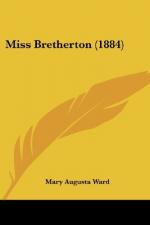’Then I’ll certainly come, and do my worshipping before the crowd collects,’ said Kendal, adding, as he half-curiously shifted his eye-glass so as to take in Wallace’s bronzed, alert countenance, ’How did you happen to know her?’
‘Rutherford introduced me. He’s an old friend of mine.’
‘Well,’ said Kendal, moving off, ’Friday, then. I shall be very glad to see Mrs. Stuart; it’s ages since I saw her last.’
The American nodded cordially to him, and walked away. He was one of those pleasant, ubiquitous people who know every one and find time for everything—a well-known journalist, something of an artist, and still more of a man of the world, who went through his London season with some outward grumbling, but with a real inward zest such as few popular diners-out are blessed with. That he should have attached himself to the latest star was natural enough. He was the most discreet and profitable of cicerones, with a real talent for making himself useful to nice people. His friendship for Miss Bretherton gave her a certain stamp in Kendal’s eyes, for Wallace had a fastidious taste in personalities and seldom made a mistake.
Kendal himself walked home, busy with very different thoughts, and was soon established at his writing-table in his high chambers overlooking an inner court of the Temple. It was a bright afternoon; the spring sunshine on the red roofs opposite was clear and gay; the old chimney-stacks, towering into the pale blue sky, threw sharp shadows on the rich red and orange surface of the tiles. Below, the court was half in shadow, and utterly quiet and deserted. To the left there was a gleam of green, atoning for its spring thinness and scantiness by a vivid energy of colour; while straight across the court, beyond the rich patchwork of the roofs and the picturesque outlines of the chimneys, a delicate piece of white stone-work rose into air—the spire of one of Wren’s churches, as dainty, as perfect, and as fastidiously balanced as the hand of man could leave it.
Inside, the room was such as fitted a studious bachelor of means. The book-cases on the walls held old college classics and law-books underneath, and above a miscellaneous literary library, of which the main bulk was French, while the side-wings, so to speak, had that tempting miscellaneous air—here a patch of German, there an island of Italian; on this side rows of English poets, on the other an abundance of novels of all languages—which delights the fond heart of the book-lover. The pictures were mostly autotypes and photographs from subjects of Italian art, except in one corner, where a fine little collection of French historical engravings completely covered the wall, and drew a visitor’s attention by the brilliancy of their black and white. On the writing-table were piles of paper-covered French books, representing for the most part the palmy days of the Romantics, though every here and there were intervening strata of naturalism, balanced in their turn by recurrent volumes of Sainte-Beuve. The whole had a studious air. The books were evidently collected with a purpose, and the piles of orderly MSS. lying on the writing-table seemed to sum up and explain their surroundings.




